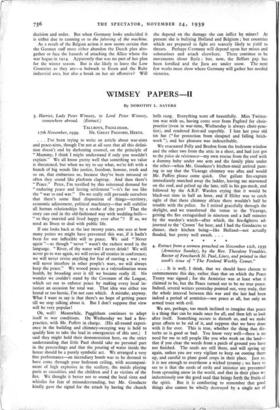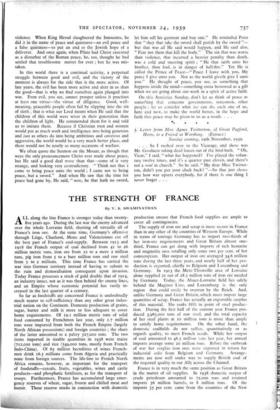4. Extract from a sermon preached on November 12th, 1939
(Armistice Sunday), by the Rev. Theodore Venables, Rector of Fenchurch St. Paul, Lines, and printed in that week's issue of " The Fenland Weekly Comet."
. . . It is well, I think, that we should have chosen to commemorate this day, rather. than that on which the Peace Treaty was signed ; for the Armistice was at least what it claimed to be, but the Peace turned out to be no true peace. Indeed, several writers yesterday pointed out, very truly, that the whole interval between this war and the last had been indeed a period of armistice—not peace at all, but only an armed truce with evil.
We are, perhaps, too much inclined to imagine that peace is a thing that can be made once for all, and then left to look after itself. Something occurs to disturb us, and we make great efforts to be rid of it, and suppose that we have done with it for ever. This is true, whether the thing that dis- turbs us is good or bad. You know very well—there is no need for me to tell people like you who work on the land— that if you clear the weeds from a patch of ground you have not finished. The seeds are still there, and will spring up again, unless you are very vigilant to keep on rooting them up, and careful to plant good crops in their place. Just so, it is not enough to overthrow a wicked tyranny ; we have to see to it that the seeds of strife and injustice are prevented from sprouting anew in the world, and that in their place we industriously sow the good seed that brings forth the fruits of the spirit. But it is comforting to remember that good things also cannot be wholly destroyed by a single act of violence. When King Herod slaughtered the Innocents, he did it in the name of peace and quietness—an evil peace and a false quietness—to put an end to the Jewish hope of a deliverer. And once again, when Pilate had Christ executed as a disturber of the Roman peace, he, too, thought he had settled that troublesome matter for ever ; but he was mis- taken.
In this world there is a continual activity, a perpetual struggle between good and evil, and the victory of the moment is always for the side that is the more active. Of late years, the evil has been more active and alert in us than the good—that is why we find ourselves again plunged into war. Even evil, you see, cannot prosper unless it practises at least one virtue—the virtue of diligence. Good, well- meaning, peaceable people often fail by slipping into the sin of sloth , that is what our Lord meant when He said that the children of this world were wiser in their generation than the children of light. He commended them for it and told us to imitate them. Because if Christian men and women would put as much work and intelligence into being generous and just as others do into being ambitious and covetous and aggressive, the world would be a very much better place, and there would not be nearly so many occasions of warfare.
We often quote the Sermon on the Mount, as though that were the only pronouncement Christ ever made about peace, but He said a good deal more than that—some of it very strange, and looking very contradictory. " Think not that i came to bring peace unto the world ; I came not to bring peace, but a sword." And when He saw that the time for peace had gone by, He said, "now, he that hath no sword, let him sell his garment and buy one." He reminded Peter that " they that take the sword shall perish by the sword "- but that was all He said would happen, and He said also, " Fear not them that kill the body." The sin that was worse than violence, that incurred a heavier penalty than death, was a cold and sneering spirit ; " He that saith unto his brother, thou fool, is in danger of hell-fire." Yet He is called the Prince of Peace—" Peace I leave with you, My peace I give unto you. Not as the world giveth give I unto you." He thought of peace, you see, as something that happens inside the mirid—something extra bestowed as a gift when we are going about our work in a spirit of active faith.
On this Armistice Sunday, don't let us think of peace as something that concerns governments, statesmen, other people ; let us consider what we can do, each one of us, here and now, to make the world better, in the hope and faith that peace may be given to us as a result. . . .
• *





































 Previous page
Previous page